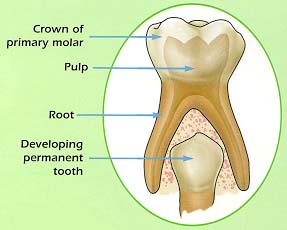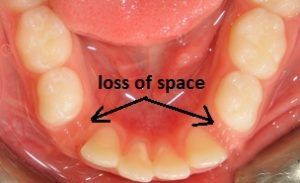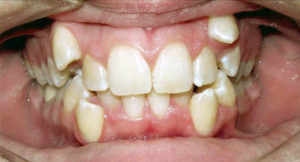Disclaimer :: This sponsored post was crafted by the dental experts and Fort Worth Forth Moms Blog partners at Legacy Pediatric and Adolescent Dentistry.
When making your child’s first dentist appointment, the question often comes up: Why should I worry about baby teeth, if they’re just going to fall out anyways? Part of this is true — the baby teeth will eventually fall out, but they also play an integral role in the health and development of the mouth before they come out. Children generally have baby teeth until they are 12 or 13 years old, and the average time for the first tooth to come in is around six months, so the primary (baby) teeth are in the mouth for a significant amount of time.
 Baby teeth are the gateway to the permanent teeth. The permanent teeth develop directly below/above the baby teeth.
Baby teeth are the gateway to the permanent teeth. The permanent teeth develop directly below/above the baby teeth.
Did you know that cavities are actually contagious? A cavity is formed by bacteria (the same kind of “bugs” that cause colds or coughs). Bacteria can spread from tooth to tooth in the same way that a cough can spread from person to person, so cavities can spread to other teeth in the mouth. The Centers for Disease Control and Prevention reports that dental caries (cavities) are the most prevalent infectious disease in children. When a cavity forms on a baby tooth, if it gets large enough, it can spread down the tooth and affect the developing permanent tooth.
 Baby teeth maintain space for the permanent teeth to come into place. If a baby tooth is lost early, the other baby teeth can shift together and cause crowding when the permanent teeth start to come in. Baby teeth may be lost early if they have large cavities leading to infection or pain in the tooth. If teeth are lost early and no retainer/spacer is placed, often the space will gradually start to close.
Baby teeth maintain space for the permanent teeth to come into place. If a baby tooth is lost early, the other baby teeth can shift together and cause crowding when the permanent teeth start to come in. Baby teeth may be lost early if they have large cavities leading to infection or pain in the tooth. If teeth are lost early and no retainer/spacer is placed, often the space will gradually start to close.
Our teeth and mouth are connected to the rest of the body. Poor dental health can lead to issues with overall health. Decay can cause problems leading to pain, infection, trouble with eating, and even problems in school. According to the American Academy of Pediatric Dentistry, more than 51 million hours of school are lost each year due to dental related illnesses. This can affect the child’s ability to concentrate and his or her overall performance in school and extracurricular activities.
 Decay can spread rapidly. Often small cavities will not cause any pain or problems and may not be able to be seen without an x-ray. If the cavity has the opportunity to grow, it can become a problem very quickly and cause pain or infection. Baby teeth are smaller and cavities can spread very quickly through the healthy tooth structure.
Decay can spread rapidly. Often small cavities will not cause any pain or problems and may not be able to be seen without an x-ray. If the cavity has the opportunity to grow, it can become a problem very quickly and cause pain or infection. Baby teeth are smaller and cavities can spread very quickly through the healthy tooth structure.
For all these reasons and more, it is important to start early with maintaining good oral health and prevention, and address problems as early as possible. It is recommended to visit the dentist by one year of age and to follow up every six months, unless otherwise advised. Most of the first visit at one years old will be dedicated to giving information about maintaining good oral health habits at home. The moral of the story is that these “little teeth” play a big role in the development of the mouth as well as our overall health and well-being, so it is best to take great care of them.
 Dr. Dan Doss grew up in Kemp, Texas before making the move to Fort Worth to attend TCU. He attended dental school and a two-year residency in the specialty of Pediatric Dentistry at the University of Texas School of Dentistry in Houston. He has been married to Maureen (Mo) for 33 years and has two grown children, Michael and Kaydee and daughter in law Megan. He is excited to welcome his first granddaughter in March 2014. He enjoys reading, playing golf and spending time with family and friends.
Dr. Dan Doss grew up in Kemp, Texas before making the move to Fort Worth to attend TCU. He attended dental school and a two-year residency in the specialty of Pediatric Dentistry at the University of Texas School of Dentistry in Houston. He has been married to Maureen (Mo) for 33 years and has two grown children, Michael and Kaydee and daughter in law Megan. He is excited to welcome his first granddaughter in March 2014. He enjoys reading, playing golf and spending time with family and friends.
Dr. Liz Gold grew up in Palestine, TX. She attended Texas A&M University where she graduated in 2006 and proceeded to continue her education at the University of Texas School of Dentistry in Houston where she completed both dental school and residency. She has 4 siblings and 3 in-laws and has recently become an aunt to Luke (22 months) and Emma (3 months). In her free time she enjoys traveling, running, Aggie football games and spending time with family and friends.
Dr. Doss and Dr. Gold practice at Legacy Pediatric & Adolescent Dentistry in Southwest Fort Worth. They are both Diplomates of the American Board of Pediatric Dentistry and members of the American Academy of Pediatric Dentistry as well as local, state and national dental societies.













